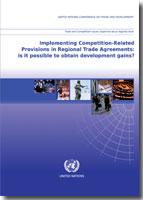
The increasing share of developing countries in world trade and investment flows has been accompanied since the 1990s in particular by a proliferation of bilateral and regional trade agreements (RTAs), many of them containing provisions on competition policy. The same period has also seen the adoption of competition law and policy in virtually all corners of the globe.
This new generation of trade agreements has shifted the focus away from simple tariff reduction and towards ‘behind-the-border’ issues more generally. In terms of the relationship between trade and competition, competition provisions in RTAs have been viewed as one way of ensuring that the gains from tariff liberalization are not eroded by the substitution of private restrictive practices for government trade barriers. UNCTAD examined the effects of these provisions in a 2005 publication on Competition Provisions in Regional Trade Agreements: How to Assure Development Gains, which also looked at the strengths and weaknesses of the various institutional arrangements in place dealing with regional competition problems.
By way of follow-up, this publication considers the interrelationship between competition law and policy, economic development and trade. It shows the constraints faced by developing countries in using existing cooperation mechanisms and suggests ways to foster a culture of competition in developing-country markets. The book also stresses the importance of improving the institutional capacities of recently established competition authorities in developing countries to deal with anti-competitive practices in their own markets and help their enterprises deal with them in international markets.
This volume, part of UNCTAD’s analytical and capacity-building work to assist developing countries on issues related to competition law and policies, makes a useful contribution to the policy debate, raising awareness and enhancing expertise among all stakeholders.
The publication also contains reports of a meeting in Geneva and a series of regional seminars held in Turkey, the Republic of Korea, South Africa and Brazil, dedicated to this topic besides a preliminary dissemination held in Geneva. Together with the chapters, they provide an invaluable aid to policy makers wanting to understand the negotiation and implementation of regional and bilateral trade agreements with respect to competition policies and they underscore the importance of competition policy to development.
Regional Seminars:
- Istanbul, Turkey: 31 July – 1 August 2006
- Gyeongju City , Republic of Korea: 6–7 September 2006
- Cape Town , South Africa: 4 October 2006
- São Paulo, Brazil: 30 November – 1 December 2006
Quick Links: | International Development Research Centre |


